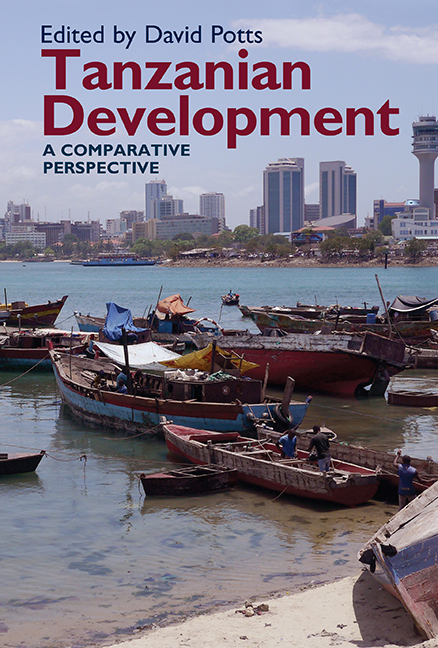Book contents
- Frontmatter
- Contents
- List of Illustrations
- Contributors
- Acknowledgements
- 1 Introduction – Tanzanian Development: A Comparative Perspective
- 2 The Political Economy of Tanzania 1967–2017: Reimagining the State
- 3 Reflections on the Tanzanian Trajectory: Decline and Recovery
- 4 Agricultural Development in Tanzania
- 5 Assets and Poverty Dynamics: The Methodological Challenges of Constructing Longitudinal Surveys in Tanzania
- 6 Contract Farming in Tanzania: Experiences from Tobacco and Sunflower
- 7 ‘We Just Sell Water – That is All We Do’: Two Cases of Small-scale Irrigation in Tanzania
- 8 The Industrial Development of Tanzania in Comparative African Perspective
- 9 Competitiveness in African Manufacturing: Some Evidence from Tanzania
- 10 ‘Good Life Never Comes Like Dreams’: Youth, Poverty and Employment in Arusha
- 11 International Aid to Tanzania – with some comparisons from Ghana and Uganda
- 12 Real Exchange Rate Changes and Export Performance in Tanzania and Ethiopia
- 13 Economic Leakage as a Constraint on Tourism's Effective Contribution to Local Economic Development in Tanzania
- 14 Extractive Industry Revenues and their Expenditure in Local Government Authorities: The Case of the Gold Service Levy in Geita District Council in Tanzania
- 15 Conclusion
- References
- Index
11 - International Aid to Tanzania – with some comparisons from Ghana and Uganda
Published online by Cambridge University Press: 24 October 2019
- Frontmatter
- Contents
- List of Illustrations
- Contributors
- Acknowledgements
- 1 Introduction – Tanzanian Development: A Comparative Perspective
- 2 The Political Economy of Tanzania 1967–2017: Reimagining the State
- 3 Reflections on the Tanzanian Trajectory: Decline and Recovery
- 4 Agricultural Development in Tanzania
- 5 Assets and Poverty Dynamics: The Methodological Challenges of Constructing Longitudinal Surveys in Tanzania
- 6 Contract Farming in Tanzania: Experiences from Tobacco and Sunflower
- 7 ‘We Just Sell Water – That is All We Do’: Two Cases of Small-scale Irrigation in Tanzania
- 8 The Industrial Development of Tanzania in Comparative African Perspective
- 9 Competitiveness in African Manufacturing: Some Evidence from Tanzania
- 10 ‘Good Life Never Comes Like Dreams’: Youth, Poverty and Employment in Arusha
- 11 International Aid to Tanzania – with some comparisons from Ghana and Uganda
- 12 Real Exchange Rate Changes and Export Performance in Tanzania and Ethiopia
- 13 Economic Leakage as a Constraint on Tourism's Effective Contribution to Local Economic Development in Tanzania
- 14 Extractive Industry Revenues and their Expenditure in Local Government Authorities: The Case of the Gold Service Levy in Geita District Council in Tanzania
- 15 Conclusion
- References
- Index
Summary
Introduction
This chapter analyzes international aid (Official Development Assistance or ODA) to Tanzania over the period from 1980 to 2012 and makes comparisons with Ghana and Uganda, countries that are also significant recipients of aid and have experienced similar pressures from donors for policy reform. It considers the implications of some issues arising from the ODA statistics and reviews relevant literature, including official publications, relating to the Tanzanian ‘aid experience’. Particular attention is paid to the impact of aid on economic growth and poverty reduction. Specific Tanzanian ‘aid issues’ are discussed including Budget Support, corruption and alignment with the principles of the Paris Declaration.
The cases of two of the three countries referred to in this chapter, Tanzania and Ghana, are also discussed in Whitfield (2009). The growth experiences of all three of the countries discussed in this chapter are also referred to in Chapter 1 of this volume. Whitfield and Fraser (2009) make the point that the economies of some of the countries previously regarded as highly aid-dependent have experienced rapid economic growth and are now both less aid-dependent and have access to other sources of funding, particularly China and India. Such changes in the availability of funding options have implications for issues such as policy conditionality, although the reforms already carried out imply that such issues are no longer a major source of disagreement.
Initially this chapter presents the aid statistics for the three countries in recent years. It then considers their respective records in terms of economic growth and poverty reduction and makes comparisons of the aid experiences and growth outcomes for the three countries. The chapter then proceeds to examine the specific case of Tanzania in detail in relation to the issues of Budget Support, corruption and the specific aid strategies adopted over time before concluding on the Tanzanian experience.
Aid to Tanzania, Ghana and Uganda
Table 11.1 shows summary data from the OECD DAC's website (OECD DAC 2014a) for the years 2010 to 2012. In current US$ prices Tanzania's per capita Gross National Income (GNI) has recently been about 20 per cent higher than that of Uganda, and Ghana has a per capita GNI about 2½ to 3 times that of Tanzania and Uganda.
- Type
- Chapter
- Information
- Tanzanian DevelopmentA Comparative Perspective, pp. 214 - 241Publisher: Boydell & BrewerPrint publication year: 2019



